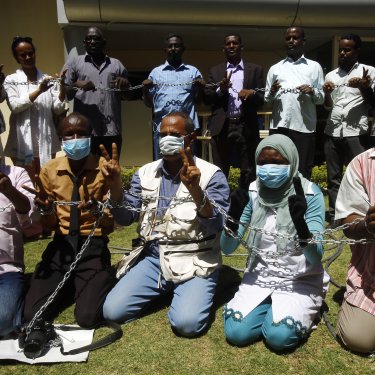Punitive seizures of Sudanese newspaper issues

Reporters Without Borders (RSF) is concerned about repeated seizures of newspaper issues by Sudan’s National Intelligence and Security Service (NISS) and calls on the authorities to end this form of censorship.
The NISS confiscated the latest issue of the daily Al-Saiha on 17 of April without any reference to the courts and without any explanation. A few days ago, the NISS has requested a meeting with the newspaper’s senior staff to discuss its editorial policies but, in the end, the meeting did not take place.
This was the fifth seizure in less than a month. Last week, the NISS confiscated the entire issues of the newspaper Al-Taghyeer two days running, on 12 and 13 April, after interrogating its editor, Sumai Sayed. She said she was questioned about an article about the International Criminal Court, which has indicted President Omar al-Bashir on charges of crimes against humanity and war crimes.
The issues of two newspapers, Al-Ayam and Al-Mustaqilla, were seized on 27 March. Al-Ayam had run a series of articles about the failure of the peace talks between the government, opposition and three rebels movements, which met in Addis Ababa in March.
“The NISS is very fond of this form of censorship, which both prevents entire print runs from circulating and deprives newspapers of their day’s takings,” RSF said. “We call on the Sudanese authorities to end these outrageous practices and to stop harassing the media.”
Aside from these confiscations, the NISS is in the habit of summoning journalists, detaining them arbitrarily, and submitting them to long and arduous interrogations. And when journalist Faisal Mohamed Saleh tried to fly to London on 25 March, NISS officers seized his passport and told him he was on a list of people who were banned from travelling abroad. On 10 April, the authorities in North Darfur state reimprisoned Ibrahim Bagal Siraj, a journalist who had been released just a week earlier after being held for 55 days.
Sudan is ranked 174th out of 180 countries in RSF’s 2015 World Press Freedom Index.



